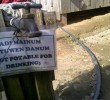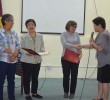Davao City-Industry, government and the academe have linked arms to develop the apiculture (popularly known as beekeeping) industry in the region.
The Mindanao business council (MinBC), together with UP Mindanao and a group of some 30 stakeholders from neighborhood households, non-government organizations (NGOs) and corporate farms, went through a beekeeping training with resource persons led by Dr. Cleofas Cervancia, director of the UP Los Ba�os Institute of Biological Science. Some 12 participants from the newly-trained core group will work on the 22 hives in the pilot farm that has been set up in the Mintal campus of UP Mindanao.
Businessman Vicente Lao, concurrent chairman of the MinBC and the regional development council, personally advocated for the creation and development of apiculture. According to Lao, although Davao region’s financial reports show growth, poverty incidence is also increasing. �The beekeeping industry will help in poverty alleviation because it is accessible to many, from housewives to small enterprises to corporate farms.�
Lao added that Davao — Mindanao — has a strong competitive advantage in the industry because there are no typhoons and bees can be productive all year round. He added that there is very good supply of coconuts, the staple food of bees. �If this grows into a backyard industry where labor is home-based, the only cost will be depreciation. If a housewife attends to 3 or 4 hives, it can bring her an extra 2,500 pesos per month,� Lao said.
Lao observed that not many local government units (LGUs) are into apiculture. He said he wanted to promote beekeeping to the LGUs throughout Mindanao. He said he enlisted the help of several NGOs to advocate honey production to highlanders and indigenous tribes by cultivating native honeybees. �As our bee colonies increase, we can meet domestic demands and eventually export to many countries.”
Department of Trade and Industry (DTI) undersecretary Merly Cruz, who was present at the close of the seminar, congratulated the group and said there was a need for the �new industry� to contribute towards a sustained level of export. She assured that the bee industry would be placed among the priorities of the one-town, one-product (OTOP) initiative of the DTI. She added that the funds could be sourced from various government agencies or from JICA for industry growth.
Cruz said that MinBC was the “anchor� of apiculture. She said MinBC’s role is to provide the market and to ensure that the industry is market-driven. She also hailed the participation of UP Mindanao. She said the academe could hasten the growth of the industry by contributing knowledge and decreasing the period for trial-and-error, and by contributing to the capacity building of the stakeholders, and by delivering the intangibles that could attract the market.
UP Mindanao chancellor Gilda Rivero thanked Lao and Cruz for the opportunity to participate in the project. She said it was in their mandate and benefitted the settlers in the neighborhood community. She said that the industry-academe partnership is ideal because the academe produces technology which can be utilized by industry.
Rivero expressed confidence that UP Mindanao could also tap its more advanced constituent universities in the UP system, who could serve as resource persons, assisting through visits, e-mail or even by text messaging. (UP Mindanao/PIA XI)










